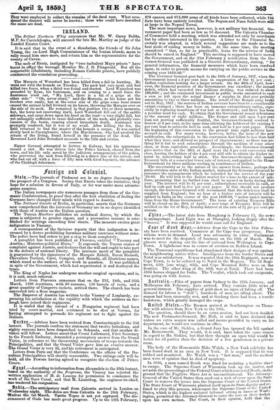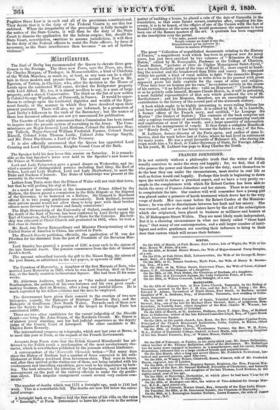foreign ad Colonial.
staht.—The journals of Piedmont are in no degree discouraged by the prospect of a Congress. Seeing that Russia takes the initiative, they hope for a solution in favour of Italy, or for war under more advanta- geous auspices.
The Italian newspapers cite numerous passages from those of the Ger- manic Confederation in proof that after the first ebullition of feeling the Germans have changed their minds with regard to Austria. The National Gazette of Berlin, in particular, asserts that the Germans now comprehend that the interests of Germany are in no degree identified -with those of Austria on the Italian question. The Tuscan Monitors publishes an archducal decree, by which the press is subjected to greater rigour, and a preventive censure is esta- blished fbr writings exceeding four sheets. The measure excites great Indignation in Tuscany.
A correspondent of the Dpinione reports that this indignation is in- creased by a decree prohibiting harmless military exercises without arms. The police have had orders to put a stop to them completely. A pamphlet has been published at Florence entitled "Tuscany and Austria ; Historico-political Hints." It expounds the Tuscan causes of complaint against Austria, and declares that she will and ought to take part in the defence of national liberty. The intrinsic merit of the pamphlet is guaranteed by the signatures of the Marquis Ridolfi, Baron Ricasoli, Chevaliers Peruzzi, Carsi, Cempini, and Bianchi, all illustrious names, -which stand as the authors of the work in question. It was published in spite of the Government, which had sequestrated it and destroyed the
tYPes- The King of Naples has undergone another surgical operation, and is, it is said, much relieved.
Letters from Piacenza announce that on the 23d, 24th, and 25th March, 1200 Austrians, with 50 cannons, 150 barrels of resin and a great quantity of Congreve rockets, arrived there. The church has been converted into a flour magazine.
The Emperor of Austria has written to the Viceroy of Lombardy, ex- pressing his satisfaction at the rapidity with which the soldiers on fur- lough have joined their regiments. It is stated that the colonel of a Hungarian regiment had been tried by court-martial, and sentenced to be shot at Verona, for having attempted to persuade his regiment not to fight against the Italians.
Ufkrti.—Advices have been recived from Constantinople to the 23d instant. The journals confirm the statement that twelve battalions, and eighty cannons have been despatched to Schumla, and that another di- -vision will follow. Letters assert that Count Lallemand, First Secretary to the French Embassy, demanded a peremptory answer from the Grand Vizier, in reference to the threatening movements of troops towards the Principalities, and that the Grand Vizier gave him an evasive answer. The Grand Vizier is very ill, andhis retirement is anticipated.
Letters from Paris say that the Conference on the affairs of the Da- nubian Principalities will shortly reassemble. Two sittings only will be held, all the Powers having agreed to recognize the election of Prince Couza.
fillill1.—Aecording to information from Alexandria to the 20th instant, based on the authority of the .Progresso, the Viceroy has rejected the written application of M. -de Lesseps for permission to commence the work of the Suez Canal, and that M. Lieantbeg, the engineer-in-chie has tendered his resignation.
Ital.—The anticipatory mail from Caleutta arrived in London on Wednesday night. The dates are from Calcutta to the 25th February, 'Madras the 1st March. Tantia Topee is not yet captured. The dis- armament of Oude has made great progress. Up to the 12th February, 378 cannon and 975,000 arms of all kinds have been collected, while 756 forts have been entirely levelled. The Begum and Nana Sahib were still at large in the Nepaul Terrai.
The most important news, however, is not military but financial. Go- vernment paper had been as low as 16 discount. The Calcutta Chamber of Commerce held a meeting, which was attended not only by merchants but by others interested in the question. A letter to the Financial Se- cretary was adopted, in which several suggestions are made as to tho best mode of raising money in India. At the same time, the meeting considered " that, so far as practicable, loans for the service of India should be raised in England." This meeting is supposed to have moved the Government, and on the 21st February a notification from the Go- vernor-General was published in a Gazette Extraordinary, stating, " for general information, the financial measures which have been resolved upon, in order to provide means for carrying on the public service in the coming year 1869-60."
The Governor General goes back to the 16th of January, 1857, when the Government issued a 5 per cent loan in suppression of the 41 per cent. ; Indian capitalists looking for a larger return. On the 30th of April, how- ever, the financial position of the Government was excellent ; the annual deficit, which had exceeded two millions sterling, was reduced to about 180,0001., and the continued investment in public works amounted to such a sum as left upon the actual finance a surplus in that year probably amounting to two or three millions. The revolt of the Bengal army broke out in May, 18.57; the sources of Indian revenue have been to a considerable extent cramped ; there has been an immense extraordinary outlay, espe- cially in replacing munitions of war lost or destroyed ; and there has been a peculiar need for cash. To obtain that the Government issued debentures to the amount of eight millions. The former and still open 5 per cent loan not proving sufficiently fruitful, the Governor-General resolved to borrow at 6 per cent, at the same time allowing the holders of the existing 6 per cent loan to subscribe half in cash, and half in 4 per cent paper. From the beginning of this conversion to the present time eight millions have accrued in cash. For many weeks, however, before the issue of the new notification, the subscriptions to the conversion had fallen to less than half what they were, and showed no prospect of improvement ; so there was no- thing for it but to seek subscriptions through the medium of some other class, or from capitalists generally. Accordingly, the Governor-General gave notice that on the 30th of April next the 4 per cent conversion will close, leaving the holders of the 4 per cent still able to obtain the higher in- terest by subscribing half in stook. The Governor-General also issued Treasury bills at a somewhat lower rate of interest, and applied to the Home Government for three millions sterling in remittances of bullion. The uncertainty as to the nature of the answer from home, perhaps the panic-stricken state of the Indian market, induced the Governor-General to announce the arrangements which he intended for the service of the year '59-60. He will look to the Indian market for a lone to the extent of mil- lions, promising that no further loan shall be opened in India during that year. The interest will be 5i per cent., subscriptions receivable in cash, or half in cash and half in five per cent paper. If this should not produce enough, the Governor-General will recommend that the deficiency shall be supplied from England ; but no loan at a higher rate of interest will be opened in India in the course of the year 1859-60, "unless under instruc- tions from the Home Government." The issue of existing Treasury Bills will be closed on the 30th of April; a new issue of Treasury Bills will be notified on the 1st of May, bearing interest at the rate of 21 pie per cent per annum.
ton 8 .—The latest date from Hongkong is February 15, the news is unimportant. Lord Elgin was at Shanghai, looking shaply after the "braves." It was supposed he m-ould soon sail for England.
Cliff tif MA 111141P.—Advicea from the Cape to the 21st Febru- ary have been received. Commerce at the Cape was prosperous. Pro- visions were in demand. Land was advancing in value. Parliament was to meet for the despatch of business on the 16th of March. En- gineers were staking out the line of railroad from Wellington to Cape Town. A lighthouse was in course of erection on Robben Island.
The Transvaal republicans had abandoned their designs of war against the neighbouring native tribes. Intelligence from the border States and Natal was satisfactory. It was reported that the 59th Regiment, now at Cape Town, is to be ordered up to Natal in the Megsera. The 2d Regi- ment, 45th (one wing), 85th, and Cape Mounted Rifles were on the frontier. The other wing of the 45th was at Natal. There had been 5105 horses shipped for India. The Vocalist, which took out emigrants, was going on with horses.
litStr a IL—Files of papers from Sydney to the 27th January, and Melbourne 4th February, have arrived. They contain little news of general interest. The supplies of gold show no signs of falling off. The demand for labour is " dull "; hundreds of men are idling about. The season had been unusually wet, and at Geelong there had been a terrific hailstorm, which greatly damaged the crops.
guitth Ala PS.—The Bremen arrived at Southampton on Thurs- day with advices from New York to the 19th.
The question, should there be an extra session, had not been decided. The new Postmaster-General, Mr. Ilolt, is said to have declared that unless an extra session was called and means provided to carry on his department, he would not continue in office.
In the ease of Mr. Sickles, a Grand Jury has ignored the bill against Mr. Butterworth. They would, it is said, have taken the same course in regard to Mr. Sickles, but that they thought an open trial would he better for all parties than the decision of a few gentlemen in a private room.
The body of the Honourable Mike Walsh, a New York celebrity has been found dead in an area in New York. It is supposed that he was robbed and murdered. Mr. Walsh was a "fast man," and tho medical men were of opinion that he died of apoplexy.
In 1866, a man named Booth was fined for assisting a fugitive slave to escape. The Supremo Court of Wisconsin took up the matter, and set aside the proceedings of the Federal Court which convicted Booth, on the ground that the Fugitive Slave Act is unconstitutional. The Attorney- General of the United States then sued out a writ of error upon the State Court to remove the issues into the Supreme Court of the United Staten The State Court of Wisconsin planted itself upon its State
fused to obey this process, whereupon the Supreme Court of the Viteld. dignity and. re-
States, which is the highest national tribunal sitting
hold that the ington permitted the Attorney-General to enter the cainso on their(locket -npon Lia own motion. The Court, in their opinion,
Fugitive Slave Law is in each and all of its provisions constitutional. They decide that it is the duty of the Federal Courts to see this law enforced. When the irregularity of the proceedings is fully brought to the notice of the State Courts, it will then be the duty of the State Court to dismiss the application for the habeas corpus ; but, should the State Court., nevertheless, continue to assume jurisdiction, it will then be the duty of the Federal officers to resist the State officers, by force if necessary, as the State interference then becomes "an act of lawless violence."



























 Previous page
Previous page